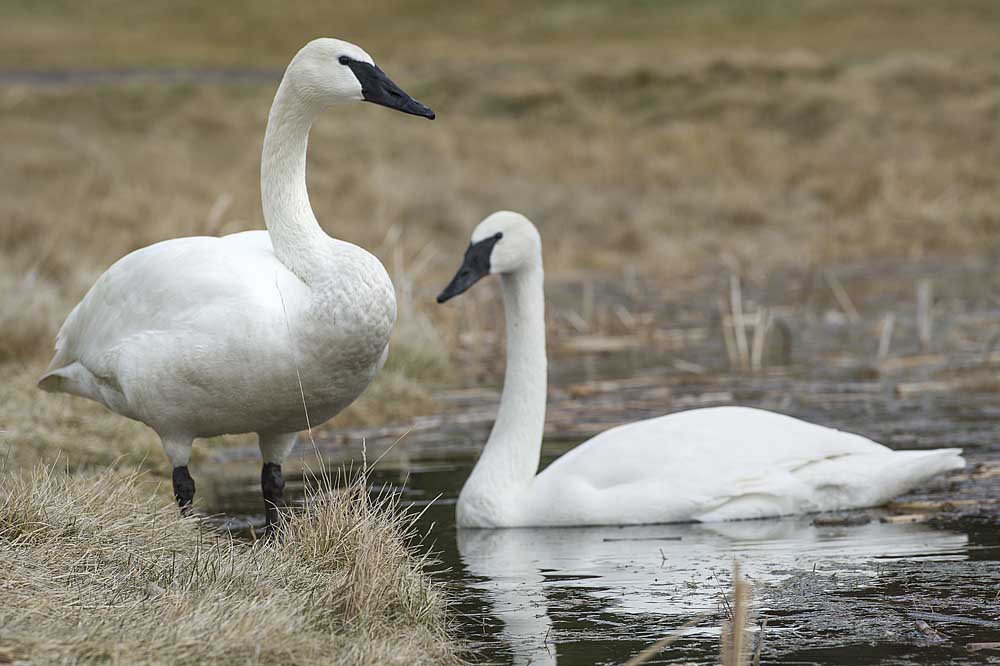Swan pair in Sisters could boost state breeding effort
Published 12:00 am Monday, April 2, 2018

- Pete, a trumpeter swan relocated from North Carolina, stands near the edge of a pond at Aspen Lakes Golf Course as his mate Eloise stays close by Wednesday. BELOW: Robin Gold, a licensed wildlife rehabilitator, talks to the pair. Gold, who feeds the swans daily, helped to relocate Pete from the South.(Ryan Brennecke/Bulletin photos)
An adored trumpeter swan left widowed last year will get a second chance to breed.
Eloise, a lone swan at the Aspen Lakes Golf Course in Sisters, was introduced last month to Pete, a male swan from North Carolina who was donated to the golf course to enhance Oregon’s trumpeter swan breeding program.
Trending
The two swans are currently the only pair in the state’s breeding program since beloved Sunriver Nature Center swan, Gracie, lost her mate, Chuck, when he was shot and killed on Thanksgiving. And a third female swan remains alone on the Deschutes River in Bend, after her mate died a few years ago.
“That’s how this has gone,” said Simon Wray, conservation biologist with the Oregon Department of Fish and Wildlife, which oversees the swan breeding program. “Every time you think you get a pair out there, you have a setback and you have a loss.”
Wray hopes Pete and Eloise are able to breed by next spring, if not sooner. Pete is about 3 years old, a year shy of when swans usually breed. Eloise, meanwhile, is in her late teens but still able to lay eggs.
Trumpeter swans, the largest waterfowl in North America with a wingspan of 7 feet, can live up to 30 years in the wild.
Any chance for new offspring would mean huge progress in repopulating the protected species, which was hunted to near-extinction at the turn of the 20th century.
The breeding program monitors the swans as they produce offspring, which are then sent to Summer Lake Wildlife Area, a 19,000-acre site in central Lake County.
Trending
The hope is that the young swans, called cygnets, grow up in the wild environment and have offspring of their own, Wray said.
Four offspring from Chuck and Gracie will be sent to Summer Lake later this spring.
About 120 trumpeter swans, most from out of state, have been released at Summer Lake through the breeding program, which is supported by the Trumpeter Swan Society, a national conservation organization dedicated to growing wild swan populations.
As wildlife officials work to find a new mate for Gracie, they are also eagerly watching Eloise as she welcomes Pete to the golf course. Staff at the golf course said they have already seen Eloise making a nest on an island in a pond off the 12th green.
Aspen Lakes Golf Course previously had two swan pairs, including Eloise, but the other three have since died. Eloise lost her mate last fall.
Robin Gold, a wildlife rehabilitator who lives in the Aspen Lakes neighborhood, thought if she could help find a new mate for Eloise, the pair could become a key part of the state’s breeding program.
Finding an unpaired male swan with clipped wings is extremely difficult, because swans mate for life and are commonly sold in pairs, Gold said. But she called wildlife centers around the country, and finally found Pete at the Sylvan Heights Bird Park in Scotland Neck, North Carolina.
“It was like looking for a needle in a haystack, but we got lucky,” Gold said.
Gold rallied some Aspen Lakes neighbors to chip in money to buy Pete and transport him to Oregon, which cost about $1,000. She picked Pete up at the Portland International Airport on March 22, and brought him to the golf course the next day.
“I was a little nervous because Eloise has been here for so long,” Gold said. “I thought she could get territorial. But they flew together and they just swam off. It was love at first sight.”
Pam Mitchell — whose parents Keith and Connie Cyrus own the 440 acres of farmland that is today the golf course and neighborhood — said the swans have been a part of the Aspen Lakes property for about two decades.
Besides the swans being a beautiful presence, Mitchell said, she is looking forward to the possibility of Eloise and Pete successfully breeding. It would be a first at the golf course.
“To be able to be a part of the breeding program now is exciting,” Mitchell said. “Our swans have definitely nested in the past and produced eggs, but they have never been able to produce cygnets.”
Whether this spring or next, when Eloise’s nest has eggs, the wildlife officials have a plan. They will remove the eggs and keep them in an incubator, away from predators such as raccoons or coyotes. Wooden eggs would be placed in the nest until the real eggs start to hatch, at which point the real eggs would be brought back to the nest.
In Sunriver last spring, raccoons stole five eggs from Gracie’s nest. Wildlife officials don’t want to take that chance this time at the golf course.
“When it’s time, the plan is to bring the eggs back and put them under Eloise,” Mitchell said. “Hopefully that will make it more successful.”
— Reporter: 541-617-7820, kspurr@bendbulletin.com








